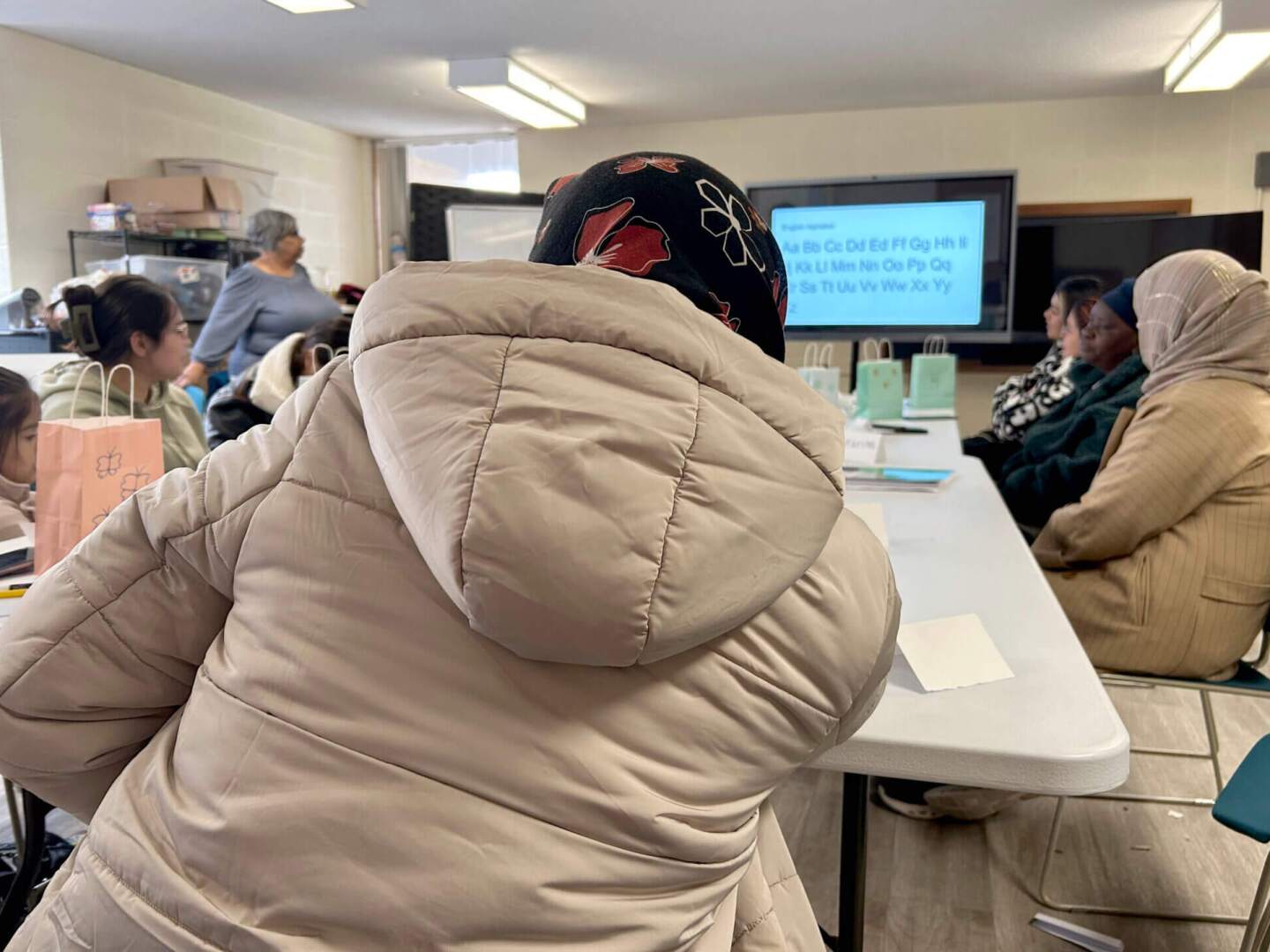Beheshte Hemid, 25, smiles while singing the ABCs with fellow women refugees at a weekly class inside Calvary Baptist Church on Broad Street in Providence.
She smiles stumbling her way through an explanation in English about the life that her family of three has set up since moving to Rhode Island from Afghanistan 11 months ago.
But Hemid’s smile becomes forced as she takes in the news that the federal food assistance she and many other clients at the Refugee Dream Center rely on will be cut off in three months. She’s too stunned to say anything. So a friend and fellow Afghan refugee speaks for her.
“It’s unbelievable,” Sitara Sakhizada said.
Yet it’s the reality coming for hundreds of thousands of lawful immigrants nationwide, whose access to critical and longstanding government safety net programs will be stripped away by the massive federal fallout from the One Big Beautiful Bill Act.
The budget reconciliation package targets some of the most vulnerable noncitizen groups: refugees, asylum seekers, and domestic violence and human trafficking survivors, for whom Supplemental Nutrition Assistance Program (SNAP) and Medicaid, along with other federal tax credits and health discounts, will be yanked away.
In Rhode Island, an estimated 2,300 people will lose SNAP benefits due to their immigration status starting Feb. 1, according to an Oct. 30 report by the Rhode Island Executive Office of Health and Human Services. Medicaid restrictions will cut off health care coverage for 9,000 adults starting Oct. 1, 2026 — children under 19 can still qualify regardless of their immigration status under state law.
Plus newly begun Medicaid work rules could preemptively kick off immigrants who are unable to find a job, or keep up with the extra paperwork, to comply.
“It’s going to be disastrous,” said Jane Rapanganwa, program coordinator for the Refugee Dream Center, which hosts the weekly women’s class that helps prepare refugees like Hemid for their new lives in America.
“A lot of our clients come from non English-speaking countries,” Rapanganwa said. “In order to get a job here, you need to be able to speak a basic level of English.”
Statewide consequences
A new report by The Economic Progress Institute details the widespread financial and economic fallout of benefits cuts for Rhode Island, where nearly 15% of the state’s population are immigrants, contributing $1.8 billion in federal, state and local taxes as of 2023, according to the U.S. Census data.
Cutting off refugees and asylum seekers from federal food assistance will cost the state $5.5 million in annual benefits funding, in turn diminishing the money spent at local grocery stores and circulating through the state’s economy. Separate federal policy changes taking effect in 2026 limit tax credits available for taxpayers with children to only include those with Social Security numbers — an identification code only available to citizens and green card holders. Lawful immigrants who pay taxes using an Individual Taxpayer Identification Number will no longer be able to claim the credit for up to $2,200 per child on their 2026 tax returns, even if their children are citizens. This will sap $30.5 million from Rhode Island residents, and in turn, the state economy in its first year, according to the report.
The report’s author, Divya Nair, senior policy analyst for children and families for The Economic Progress Institute, likened the ramifications of immigrant benefit cuts to a snowball — rolling downward as it grows.
“Basically what this bill does is deepen inequities,” Nair said in an interview. “It’s going to reduce economic participation. Resources that used to go directly to the state will be left on the table. And the state has to create administrative systems to implement all of these changes.”
Meanwhile, local food pantries and community organizations are bracing for increased demand, while health care providers, especially hospitals, will be flooded by patients who no longer have insurance coverage.
And, it will only become harder, and take longer, for refugees, asylum seekers and other immigrants to integrate into the state economy without the programs that help them to transition.
“They are still paving their way, depending mainly on government support to get going,” Rapanganwa said.
The American Dream
English classes are just one of the services the Refugee Dream Center offers. There are also classes for digital and financial literacy, help finding a job, navigating the public transit system, and other life skills. Just as important is the center’s emphasis on community building, creating a place for those fleeing persecution and trauma to seek comfort and build relationships.
The weekly women’s group that Hemid and Sakhizada attended, for example, might be the only socialization they have outside of their homes and with their immediate families, Rapanganwa said.
As they filter into the church parking lot on an overcast Thursday, the women exchange greetings and hugs before traipsing up the metal stairs tucked around the back. The mood in the small, second-floor gathering space is light as volunteer teacher Tracy Ahmadian leads the group through a series of games designed to practice their English.
It’s a much needed respite from a daily reality that for many, remains a struggle.
Leontine Makanjr, 65, has been plagued by mysterious back and chest pain, prompting multiple visits to Rhode Island Hospital to try and find out what’s wrong. Majanjr, who is from the Democratic Republic of the Congo, hopes her next appointment will yield a diagnosis, and more importantly, a treatment plan.
But she doesn’t know how she will afford doctor’s appointments or medication without Medicaid, she says.
They are still paving their way, depending mainly on government support to get going.
Ibado Mohamed similarly has no backup plan for losing SNAP benefits. The 43-year-old Somali refugee gets paid through Medicaid to care for her younger brother, who has a disability and uses a wheelchair, she said. Yet she struggles to stretch her government income, supplemented by $300 in monthly SNAP benefits, to cover groceries, rent and utilities for the three-bedroom apartment where she lives with her brother and uncle.
For Parisa Qaderi, an Afghan refugee, the bottom has already dropped out. Her husband died three months ago of a heart attack, her case worker, Noorulhaq Sadeqi, said.
Since then, the 25-year-old mom of two toddlers got a job at a West Warwick day care, earning just enough to kick her off of federal food assistance already.
Qaderi still gets a smaller federal food stipend through the Special Supplemental Nutrition Program for Women, Infants, and Children (WIC). Unlike SNAP and Medicaid, immigration status will not affect eligibility for WIC.
But it’s hard to make sense of what’s still available and for whom amid evolving federal mandates.
“For our community members, they are feeling panicked, worried,” Sadeqi said.
The new restrictions on SNAP did not initially spell out when asylum seekers and refugees will lose benefits. State administrators are still waiting for federal guidance on new Medicaid eligibility restrictions. The federal rescission package also pulls back government health insurance for legal, permanent immigrants who have had green cards for less than five years, but it’s unclear whether that extends to existing beneficiaries, or only new applicants.
The state report on federal policy changes highlights the “substantial public concern and confusion” already around eligibility, noting that it will increase calls to state agencies that administer Medicaid and food assistance, along with appeals for benefits being denied or terminated.
Hemid’s smile has been replaced by a panicked look as she stands in a narrow hallway just outside the women’s group class. Her head bowed toward Sakhizada, she begins brainstorming aloud in search of a solution to her looming SNAP cutoff.
Could she reduce her grocery list? Maybe.
More free food from the food pantry? Perhaps.
A job? That seems impossible.
Her husband already works at a medical manufacturing facility. She stays home with her baby, she said through her friend as an interpreter.
This story was originally published by the Rhode Island Current.









